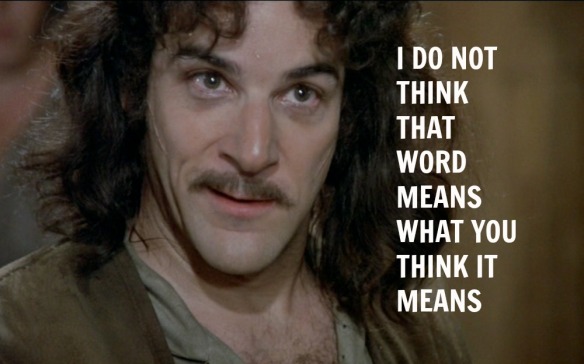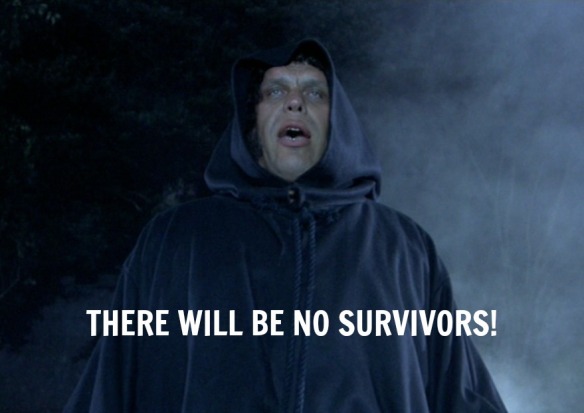Posted by Andy Proctor × January 13, 2014 at 4:30 am
Repentance

I think most people don’t repent because they don’t really know what that word means. Well, here are 6 things that repentance does NOT mean. Too many people never experience the happiness that comes from repentance because they think THIS is what it DOES mean. With Inigo Montoya I say: “I do not think it means what you think it means.”
1. Unending Suffering

Repentance doesn’t mean that we will be suffering lashes forever. One of Satan’s big lies is that to repent of something, we will have to suffer and dig and gnash for an endless amount of time before we will finally be worthy.
This is NOT true!
How was Alma the older a wicked priest of Noah who spent his strength with harlots and taught that which was contrary to the law one day, and then 5 chapters later he was baptizing hundreds of people at the waters of Mormon? How was it that Ammon and the sons of Mosiah converted thousands of wicked Lamanites after being “the vilest of sinners” who were going about trying to destroy the church? Elder Jeffrey R. Holland clarifies this:
“You can change anything you want to change, and you can do it very fast. That’s another satanic suckerpunch—that it takes years and years and eons of eternity to repent. It takes exactly as long to repent as it takes you to say, “I’ll change”—and mean it.” 1
That’s it. If you want to change, you can do it as fast as you decide to (and truly mean it). And if you truly mean it, you WILL spend the rest of your life as a different person. No suffering for an eternity of pains-taken “repentance mess” but constantly experiencing the happiness of a new life, forever. Indeed, Ammon and the sons of Mosiah spent the rest of their lives proving that their moment of “I change” was really what they meant. And they also spent the rest of their lives experiencing TRUE JOY. Just read Alma chapter 26 for an example.
Repentance doesn’t mean guilt and suffering forever. Repentance means choosing joy.
2. Isolation
This is what Satan wants. What does he say after Adam and Eve realize their nakedness? To isolate ourselves from God. To hide from Him. Why would we want to hide from God? If our heavenly Father is truly all-loving (which He is), then we NEVER need to isolate ourselves from Him. We only lose power when we withdraw from God. But He is there for the woman caught in adultery as well as for the Nephi. For Moses as well as for the vilest of sinners. We must come boldly to him whether we are tromping deep in the mud or high upon the mountain top of holiness. As Paul says:
“Let us therefore come boldly to the throne of grace, that we may obtain mercy, and find grace to help in time of need.” 2
We are not to shrink and isolate ourselves in a time of need, but to go BOLDLY to the throne of grace in our time of sin – our time of need. Grace is not earned. Grace exists for those who DO NOT deserve it.
When you feel like isolating yourself from God…Go boldly to His throne.
3. Self Loathing
We are NOT to do what these silly monks did. No self flagellation. No self loathing. This is NOT repentance.
President Uchtdorf teaches this masterfully:
“The Apostle Paul taught that ‘godly sorrow worketh repentance to salvation … but the sorrow of the world worketh death.’ Godly sorrow inspires change and hope through the Atonement of Jesus Christ. Worldly sorrow pulls us down, extinguishes hope, and persuades us to give in to further temptation.
“Godly sorrow leads to conversion and a change of heart. It causes us to hate sin and love goodness. It encourages us to stand up and walk in the light of Christ’s love. True repentance is about transformation, not torture or torment. Yes, heartfelt regret and true remorse for disobedience are often painful and very important steps in the sacred process of repentance. But when guilt leads to self-loathing or prevents us from rising up again, it is impeding rather than promoting our repentance.” 3
Remember who you really are. Remember where you came from. Love yourself first, then you will naturally change what you are doing.
4. Shame

Why is there so much shame in being honest about our imperfections? Why is it scary? Why can’t we be more open? Why is there shame in sharing about our eternal progress. If angels rejoice when we decide to repent, then why not everyone else?
In my elder’s quorum last week our lesson was on overcoming addiction. We were all given a copy of the 12 Step Addiction Recovery Program. We started reading it together as a quorum. At the end the teacher asked if anyone had ever used this program and would like to share an experience.
Silence…
Even more silence…
You know the feeling. No one wants to admit that they aren’t perfect or that they have ever had any problem with anything ever… Because everyone in every elder’s quorum and relief society is perfect. Especially returned missionaries. Right? Wrong.
Finally, a bold brother voluntarily shared his experience with this program. He wasn’t ashamed one bit. He had been addicted to pornography but had gone through the 12-step program to over come it. He powerfully testified how actually being honest with himself and going through the steps changed his life forever. It saved his marriage and it saved his life. The feeling in the room completely changed. The Spirit was so strong it was tangible. You could slice it with a knife. Then others started sharing and it became a brotherhood of love. It was a sacred experience that I will never forget. It was because one bold brother decided that it was not shameful to share the truth.
Don’t be ashamed to do something that will bring you closer to God. Don’t be one of those poor souls who taste the fruit and then walk away because they are ashamed from the pointers in the great and spacious building. Coming closer to God is NEVER something to be ashamed of.
There is no fear in love. For perfect love casteth out all fear. 4
For God hath not given us the spirit of fear, but of power and of love and of a sound mind. 5
5. Giving Sin all the Attention

There will be no survivors amongst those who constantly focus on the sin to get rid of it.
Imagine yourself swimming in the ocean saying to yourself:
Don’t think about sharks.
Don’t think about sharks.
Don’t think about sharks.
What are you thinking about? SHARKS! And it is probably paralyzing you from actually focusing on swimming to safety. Even if the sharks are all around you, you still need to focus on the way out, not the sharks themselves.
Focus on the highest in you. Don’t focus on the sin. What has your attention, has you. True Repentance does NOT mean focusing on the sin.
Elder Packer said that instead of focusing our attention on the sin or the unwanted behavior, you focus the attention on doctrine and truth:
“The study of doctrines of the gospel will improve behavior quicker than a study of behavior will improve behavior. Preoccupation with unworthy behavior can lead to unworthy behavior.” 6
Let us follow Gordon B. Hinckley’s advice and “stop seeking out the storms and enjoy more fully the sunlight.” 7
6. Lack of true Conversion

It’s like Mr. Lewis says. We can’t go on being eggs forever. In his words:
“It may be hard for an egg to turn into a bird: it would be a jolly sight harder for it to learn to fly while remaining an egg. We are like eggs at present. And you cannot go on indefinitely being an ordinary decent egg. We must be hatched or go bad.” 8
Without true conversion, we stay at the egg level. We must be hatched. We must progress. We must learn to fly. We weren’t born to stay eggs. We were born to fly. Elder Marion G. Romney taught about true conversion:
“Converted means to turn from one belief or course of action to another. Conversion is a spiritual and moral change. Converted implies not merely mental acceptance of Jesus and his teachings but also a motivating faith in him and his gospel. A faith which works a transformation, an actual change in one’s understanding of life’s meaning and in his allegiance to God in interest, in thought, and in conduct. In one who is really wholly converted, desire for things contrary to the gospel of Jesus Christ has actually died. And substituted therefore is a love of God, with a fixed and controlling determination to keep his commandments.” 9
Desire for things contrary to the gospel of Jesus Christ has actually DIED. Wow. You not only want to discontinue any misdeeds you have been doing, but you desire to completely eradicate from your life all other things contrary to the gospel.
Take flight with true conversion. Take flight with true repentance.
***If you enjoyed this post, please share it with others and subscribe to the free newsletter. And to never miss a post.
1.Jeffrey R. Holland. BYU Devotionals, “For Times of Trouble.” March 18, 1980. ↩
2.Hebrews 4:16 ↩
3.Dieter F. Uchtdorf. “You Can Do It Now.” Click here for the full talk. ↩
4.1 John 4:18 ↩
5.2 Tim 1:7 ↩
6.CR Oct 1986, 20 ↩
7.Let Not Your Heart Be Troubled. BYU Devotional, Oct 1974. ↩
8.Mere Christianity p. 198 – 199. ↩
9.Marion G. Romney. Conference Report, Guatemala Area Conference 1977, 8–9. ↩
Read more http://www.thereturnedmissionary.com/6-things-repentance-does-not-mean/

